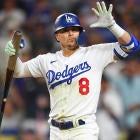
Earlier this week, super utility man Enrique Hernández returned to the Los Angeles Dodgers on a one-year contract worth $4 million. He will replace Manuel Margot, who was traded to the Minnesota Twins in part to clear a roster spot for the 32-year-old Hernández, who has played seven of his 10 MLB seasons with the Dodgers.
On Thursday, Hernández appeared on the "Foul Territory" YouTube show and voiced his displeasure with the state of free agency, and went as far as to suggest owners are colluding against the players. Here are the relevant parts:
"I'm not gonna say the C-word, but I think the C-word needs a capital C"@kikehndez says teams were making very similar calls and setting very similar deadlines during free agency.
— Foul Territory (@FoulTerritoryTV) February 29, 2024
▶️ https://t.co/hjyiu6mSGY pic.twitter.com/Hzp56wSC0b
"I'm not going to say the C-word, but I think the C-word needs a capital C," Hernández said, referring to collusion. "The timing of the calls (from teams) was very similar. The numbers were pretty much the same throughout."
A free agent receiving little to no interest for weeks before receiving multiple offers in the same salary range at the same time is not a new complaint. Francisco Liriano was among the first players to speak out about this back in 2019, but others have experienced something similar in recent years. That, of course, does not prove or even imply collusion.
Every team uses analytics and projection models these days – some are better at it than others – and these systems can be used to put a dollar value on a player and his expected future production. Widespread use of analytical models has ostensibly contributed to players being valued similarly and thus receiving similar offers, something Hernández acknowledged.
"I think the teams that are using these computer systems to project numbers, project salaries, they're all using the same one and I think they all have the same password," Hernández said. "So that's how free agency is going, and it's not just me."
Seven of our top 50 free agents remain unsigned with Opening Day less than four weeks away, including three of the top 10. Matt Chapman, J.D. Martinez, Jordan Montgomery, and Blake Snell are the top unsigned free agents. All four are Scott Boras' clients, so perhaps the sluggish free agent market is simply a matter of Boras driving a hard bargain and/or misreading the market.
That said, other bona fide major leaguers like Brandon Belt, Michael Lorenzen, Tommy Pham, and Michael A. Taylor are unsigned and they are not Boras clients. Look around the league and it's not hard to see how they could help multiple teams, and yet it's now March, and all four are still unsigned. Even non-Boras clients are having trouble finding work.
"There's still a lot of really good quality baseball players – big leaguers that are more than capable of being everyday guys on a lot of teams – and the fact that they're still out there, it's a shame," Hernández said. "... It was a very weird offseason and it still is for some guys. It doesn't seem like things are picking up either for some of those guys, which is shameful."
Collusion, which in this case means teams working together to suppress player salaries, is illegal in the United States. And there is a history of it in baseball. The MLBPA filed three collusion grievances against MLB in the 1980s and the two sides eventually agreed to a $280 million settlement in 1990. There were also collusion complaints throughout the 2000s.
Collusion is a very serious allegation and it is also extremely difficult to prove. Teams not signing players is not evidence of collusion – let's be honest here, Chapman, Montgomery and Snell all come with red flags – but rather anti-competitive behavior. Why spend an extra, say, $20 million to go from 88 wins to 92 wins when 88 wins will still get you to the postseason?
Front offices are increasingly reliant on their analytical models to put a dollar figure on players, and there are more than a few owners in the sport who place a higher priority on making a buck than winning ball games. That's not collusion, but it has fostered an environment in which the free agent market has become unfavorable for baseball's middle class of players.


















